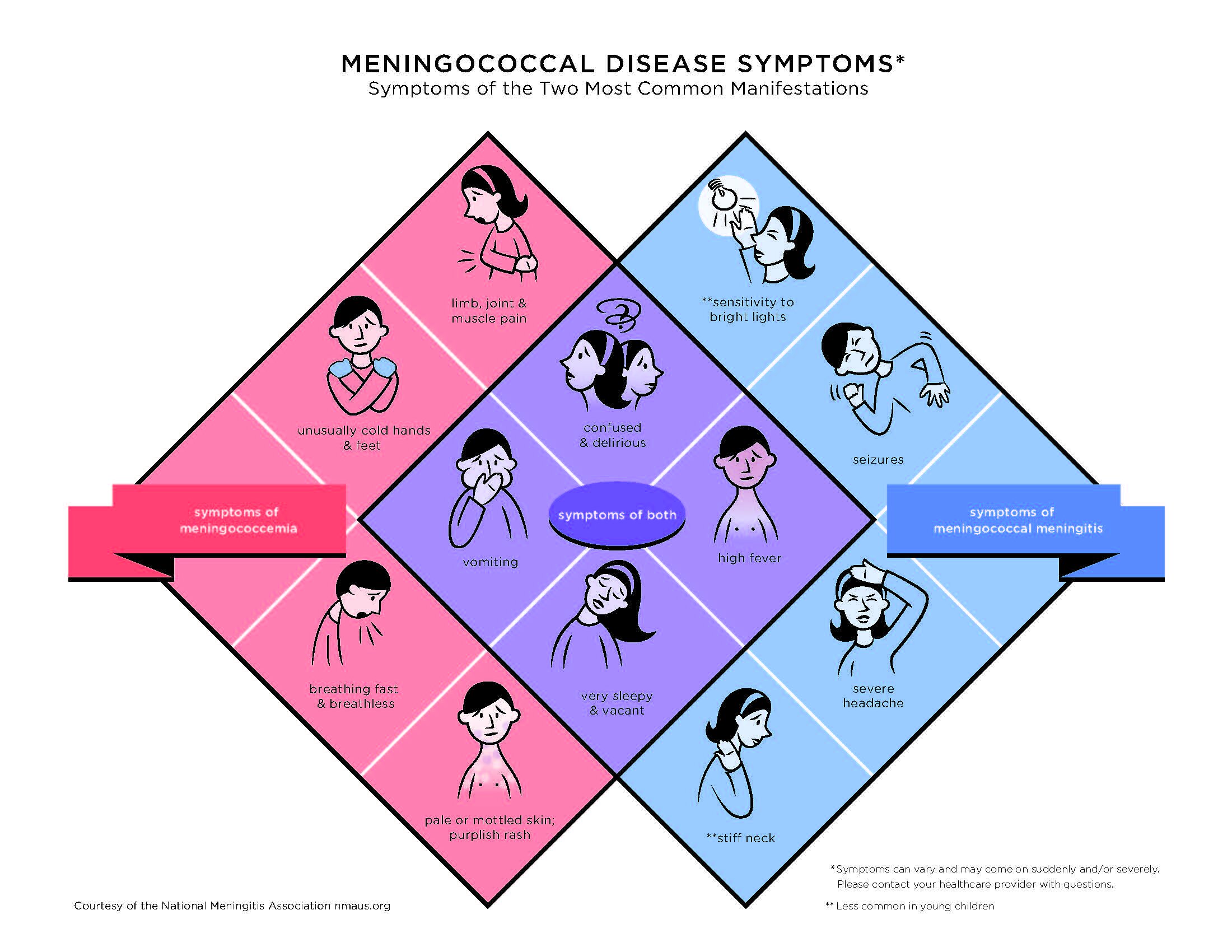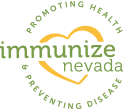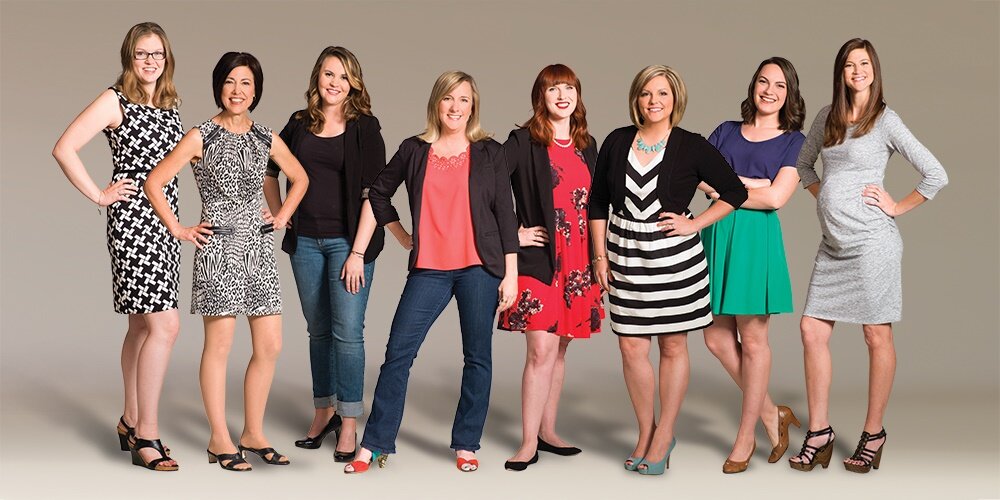Prevent Meningitis
Download What You Need to Know About the New Requirement
New Requirements for 7th Grade Enrollment
1. A child enrolling in seventh (7th) grade in a Nevada public or private school after June 30th, 2017 must receive an immunization against Neisseria meningitidis (meningitis) in the form of a quadrivalent meningococcal conjugate vaccine (MCV4). The child must receive at least one dose of MCV4 on or after age 10 years.
2. This new requirement does not apply to students enrolled in a Nevada public or private school before July 1st, 2009.
New Requirements for University Freshmen
1. A student enrolled as a freshman of a Nevada university, who is less than 23 years of age upon enrollment, may not attend university after September 1, 2017 without proof of immunity to Neisseria meningitidis (meningitis). Vaccination with at least one dose of a quadrivalent meningococcal conjugate vaccine (MCV4) on or after age 16 years will satisfy this requirement.
WHAT YOU NEED TO KNOW ABOUT MENINGOCOCCAL DISEASE
- Meningococcal disease can refer to any illness that is caused by the bacteria Neisseria meningitidis, also known as meningococcus. These illnesses are often severe and include infections of the lining of the brain and spinal cord (meningitis) and bloodstream infections (bacteremia or septicemia).
- Approximately 600 – 1,000 people contract meningococcal disease in the U.S. each year.
- Meningococcal disease is rare, but it can be deadly, leading to death in 10-15% of cases.
- Among those who survive, as many as 19% (1 in 5) live with permanent disabilities, such as brain damage, hearing loss, loss of kidney function or limb amputations.
- Prevention of meningococcal disease is critical because it can be mistaken for flu or other viral infections and it can rapidly lead to death or disability.
- Health officials recommend quadrivalent meningococcal conjugate (MCV4) vaccination at 11-12 years with a booster at 16 years. Young adults between 16 and 23 years should also ask a healthcare provider about MenB vaccination against serogroup B.
- 1 in 5 (20%) U.S. teens have not yet received their first dose of the quadrivalent meningococcal conjugate (MCV4) vaccination and remain unprotected. And less than one-third of first dose recipients have received the recommended booster dose.
- Many teens have not received the meningococcal serogroup B vaccine (MenB) since it was only recently permissively recommended by the Centers for Disease Control and Prevention (CDC) in 2015.
Q & A
Who is at risk for meningococcal disease?
Anyone at any age can contract meningococcal disease, but some groups have a higher risk for contracting the disease if exposed.
- Adolescents and young adults (11-24 years); 21% of all meningococcal disease occurs in preteens, teens and young adults.
- Infants less than 1 year;
- Those living in crowded settings such as dorm rooms or military barracks;
- Those with persistent complement component deficiencies or anatomic or functional asplenia;
- Those traveling to specific areas outside of the United States, such as the meningitis belt in Africa;
- Laboratory personnel who are routinely exposed to meningococcal bacteria; and
- Those who may have been exposed to meningococcal disease during an outbreak.
Why are adolescents and young adults at increased risk for meningococcal disease?
Certain lifestyle factors common among adolescents and young adults increase their risk. These include, but are not limited to:
- Crowded living (dormitories, boarding schools, sleep-away camps, etc.);
- Attendance at a new school with students from geographically diverse areas;
- Irregular sleeping patterns;
- Active or passive smoking;
- Social situations where there is crowding or sharing (drinks, food, lip gloss, etc.); and
- Moving to a new residence.
How is meningococcal disease spread?
Meningococcal disease is contagious. It is spread through the exchange of respiratory secretions during close contact such as kissing or coughing on someone. Although meningococcal bacteria are dangerous, they cannot live outside the human body for very long. This means the infection is not as easily spread as a cold virus. About 1 in 10 people carry meningococcal bacteria in their nose or throat without showing any signs or symptoms of the disease. These people can unknowingly transmit the bacteria to others.
Can meningococcal disease be prevented?
Yes! Vaccination offers the best protection against the disease. Routinely recommended vaccines offer protection against the bacteria (Neisseria meningitidis) that cause meningococcal disease: Serogroups A, C, W and Y. The CDC recommends the quadrivalent meningococcal conjugate (MCV4) vaccine to all adolescents at age 11-12 years with a booster recommended at age 16 years.
The CDC additionally recommends permissive use of serogroup B meningococcal vaccination (MenB vaccines) at ages 16-23 years, with a preferred age of administration at 16 to 18 years. Older adolescents and young adults can decide, in collaboration with their healthcare professionals, to be vaccinated against serogroup B and it will be covered by private and public health insurance.
Vaccination is the best method of disease prevention. However, maintaining a healthy lifestyle by getting plenty of rest, being diligent about hand-washing and avoiding close contact with people who are sick can also help.
Why a school requirement?
Enforcement of immunization requirements for children entering childcare facilities and schools has resulted in high childhood and adolescent immunization coverage levels. Nevada previously only required the Tdap vaccine for 7th grade entry, and the quadrivalent meningococcal conjugate (MCV4) vaccine was recommended to be administered at the same visit. Unfortunately, national studies show that 86% of adolescent patients who were in the office for a “vaccine-only” visit did not receive their first dose along with other age-recommended vaccines. This requirement will help Nevada improve our immunization coverage for the quadrivalent meningococcal conjugate (MCV4) vaccine.
Is this vaccine a school-enrollment requirement in other states?
Yes. Almost 40 states have a secondary school and/or university enrollment requirement for the meningococcal vaccine (MCV4-MenACWY) and almost all states have a secondary school requirement for the Tdap vaccine. For up-to-date immunization law information, visit: www.immunize.org/laws
Where is the vaccine available?
Recommended adolescent vaccines, including MCV4, can be administered by doctor’s offices, pharmacists, healthcare professionals at community clinics, community health nurses, and local health districts. Additionally, the Nevada Vaccines for Children (VFC) Program provides vaccines to children who are uninsured/underinsured, eligible for Medicaid, or Alaska Native/American Indian.
What are the symptoms of meningococcal disease?
Meningococcal disease is often misdiagnosed as early symptoms resemble those of other infections like the flu. Symptoms may include sudden high fever, headache, nausea, vomiting and exhaustion. Particularly worrisome signs of the infection include a purplish rash, pain when looking at bright lights and a stiff neck. Since symptoms progress extremely quickly, it is very important that medical attention is sought immediately as the symptoms are recognized.

RESOURCES
National Meningitis Association: www.nmaus.org/
Immunization Action Coalition: immunize.org/meningococcal/
CDC: www.cdc.gov/meningococcal/



